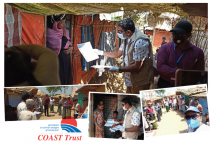Bangladesh was put in total lockdown on 26 March to 31 May 2020. As of 26 June 2020, there are 130,474 reported cases of COVID-19 in the country. The government has been on alert since the outbreak in China. Despite the lockdown of China with the rest of the world Bangladesh has managed to prepare itself for the pandemic and has taken numerous steps to curb the spreading and to keep people safe and sound.
During the lockdown, only shops related to food and medicine are allowed to operate; the rest are closed. Agriculture-related shops are also open. Bangladesh Prime Minister Sheikh Hasina called on the citizens to stay home and not to buy anything beyond the minimal necessity.
The areas that are highly vulnerable to the effects of the pandemic are affected by the pandemic are Cox’s Bazar, Bhola, and Chottogram. There are about 100,000 vulnerable people in these areas.
Farmers in Bangladesh have an adequate supply of food, but because of the quarantine, they cannot transport their produce to the market. Moreover, the current situation is not favorable for farmers because of the price ceiling imposed on agricultural products. Farmers of perishable goods are helpless because they cannot sell their produce in the market due to the travel constraints.
Considering the situation, since March 10, COAST Trust, the national implementing agency of the Asia-Pacific Farmers’ Program in Bangladesh, has implemented various activities in nine (9) coastal districts in its working areas. Earlier, the organization continued its vigilance program at various stages. So far, COAST distributed Tk 16.00 lakh to 8 coastal districts from its Disaster Mitigation Fund. Other activities included creating awareness videos, promoting shows on Facebook, creating and distributing leaflets, building awareness regularly among members, and follow-ups during home visits. In addition, employees were provided with guidance and motivation through regular video conferences.

COAST also conducted discussions and distributed of 4.5 lakh leaflets to households, schools, colleges, madrasas, religious institutions of Bhola, Barishal, Noakhali, Chattogram, Cox’s Bazar, Patuakhali, Jhalakathi, Laxmipur, Feni districts. The leaflets were distributed to 1,35,700 member-participants of microfinance programs, in 237 union parishads, 51 upazila parishad, 9 zilla parishad, 539 religious institutions, 299 madrasas, 434 primary schools, 280 high schools, and 140 colleges. district and upazila offices, and health complexes.
Moreover, Radio Meghna, a community radio located in Charfasion, regularly broadcasts awareness stories, information, news, and PSAs. These programs are also available online countrywide.
To raise awareness among the Rohingyas, on March 20-28, COAST conducted group discussions in Rohingya camps and 1.50 lakh leaflets both in Burmese and Bengali (Bangla) languages were distributed to 37 camps and 77 camp mosques.
Six different videos in Bengali, Burmese and Chittagonian languages were also produced. These videos were uploaded to the Facebook and YouTube channels of COAST Trust.
COAST also published five different types of leaflets. Notable among them were the World Health Organization’s leaflet on relief from mental stress, the International Centre for Diarrhoeal Disease Research, Bangladesh (icddr,b) and the Department of Health Prevention’s message on preventing the virus, how to stay home quarantine, the punishments if home quarantine isn’t done properly and so on.
All these materials are available in the organization’s website at www.coastbd.net.
Meanwhile, Kendrio Krishok Moitree (KKM), one of APFP’s partner organizations in Bangladesh, is also implementing initiatives to help their members amid the pandemic. Among their activities is linking farmers to the market. In some areas in the country, there are people who go directly to the farms but the downside to this is that farmers are forced to sell it at a very low price. As a result, farmers will have a hard time financing their next production.
KKM is also bridging and informing the farmers on the investors and government initiatives. There are ministries/departments of the government that are giving subsidies to farms and the farming industries. There are also loans that farmers can avail to be able to continue their production. There is a USD 588 million available for the loan program with only 4% interest, which will be available once the Bangladesh bank is done ironing out the details.
KKM also informed its members about the government program on lessening the cost for irrigation and supporting the farmers in harvesting mechanically because of the critical weather condition.
The government is also giving 5 kilograms of rice seeds and 30 kilograms of mixed fertilizer. Fifty KKM members received this support and KKM is working on informing more of their members to avail of this incentive.
KKM village members are supporting needy people in their areas because they have available vegetables that they were not able to sell. They are distributing these are relief goods.
KKM says that government initiatives are beneficial for farmers, but they worry that the implementation will not reach all farmers. KKM and its network are helping each other to raise their voice so that the farmers will receive what is supposed to go to them.

Comments are closed